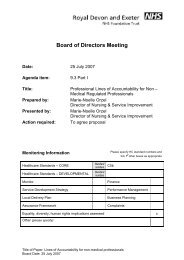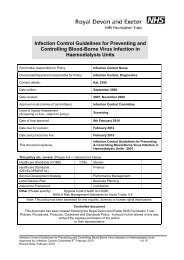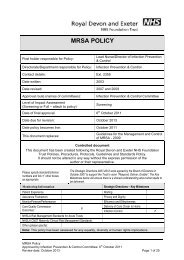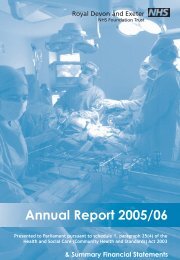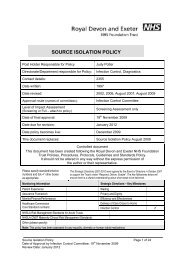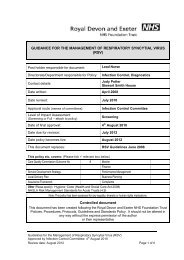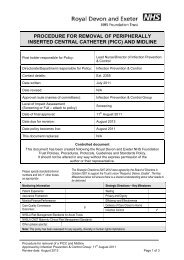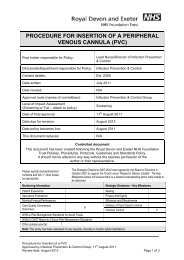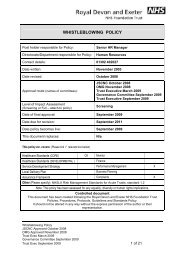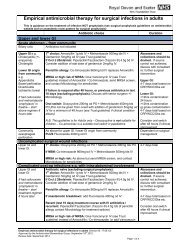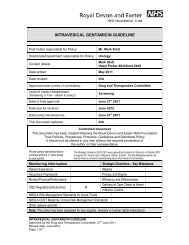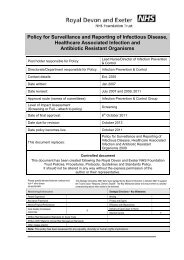Annual Report and Accounts 2012/13 - Royal Devon & Exeter Hospital
Annual Report and Accounts 2012/13 - Royal Devon & Exeter Hospital
Annual Report and Accounts 2012/13 - Royal Devon & Exeter Hospital
Create successful ePaper yourself
Turn your PDF publications into a flip-book with our unique Google optimized e-Paper software.
4. Our Governance<br />
<strong>Royal</strong> <strong>Devon</strong> <strong>and</strong> <strong>Exeter</strong> NHS Foundation Trust<br />
<strong>Annual</strong> <strong>Report</strong> <strong>and</strong> <strong>Accounts</strong> <strong>2012</strong>/<strong>13</strong><br />
69<br />
The Directors are paid<br />
for their skills, time <strong>and</strong><br />
expertise in leading the<br />
Trust both strategically<br />
<strong>and</strong> operationally,<br />
as well as for taking<br />
responsibility for the<br />
performance of the Trust<br />
<strong>and</strong> being accountable<br />
in the event of failures.<br />
The Board of Directors has both<br />
Executive <strong>and</strong> Non-Executive Directors<br />
(NEDs) with a majority of independent<br />
Non-Executive Directors. It is a<br />
unitary Board which means that both<br />
Executive <strong>and</strong> Non-Executive Directors<br />
share the same liabilities <strong>and</strong> joint<br />
responsibility for every decision of<br />
the Board. The Chief Executive is the<br />
nominated Accounting Officer <strong>and</strong> is<br />
responsible for the overall organisation,<br />
management <strong>and</strong> staffing of the NHS<br />
Foundation Trust, for its procedures<br />
in financial <strong>and</strong> other matters, <strong>and</strong><br />
for offering appropriate advice to<br />
the Board on all matters of financial<br />
propriety <strong>and</strong> regularity.<br />
In carrying out their role, Directors<br />
need to be able to deliver focused<br />
strategic leadership <strong>and</strong> effective<br />
scrutiny of the Trust’s operations, <strong>and</strong><br />
make decisions objectively <strong>and</strong> in the<br />
interests of the Trust. The Board of<br />
Directors will act in strict accordance<br />
with the accepted st<strong>and</strong>ards of<br />
behaviour in public life, which include<br />
the principles of selflessness, integrity,<br />
objectivity, accountability, openness,<br />
honesty <strong>and</strong> leadership (The Nolan<br />
Principles).<br />
The Board of Directors is legally<br />
accountable for services provided by<br />
the Trust <strong>and</strong> is responsible for setting<br />
the strategic direction, having taken<br />
account of the views of the Council<br />
of Governors, <strong>and</strong> for the overall<br />
management of the RD&E.<br />
The Board is led by the Non-Executive<br />
Chairman. There are six Non-Executive<br />
Directors who, together with the<br />
Chairman, form a majority on the<br />
Board. The six Executive Directors<br />
manage the day-to-day operational<br />
<strong>and</strong> financial performance of the Trust.<br />
The Board of Directors works on<br />
a unitary basis, being collectively<br />
responsible for the performance of the<br />
NHS Foundation Trust <strong>and</strong> exercising<br />
all the powers of the Trust. In so doing,<br />
Board Members bear full legal liability<br />
for the operational <strong>and</strong> financial<br />
performance of the Trust.<br />
The Board normally meets to conduct<br />
its core business at least ten times<br />
a year. At these meetings it takes<br />
strategic decisions <strong>and</strong> monitors the<br />
operational performance of the Trust,<br />
holding the Executive Directors to<br />
account for the Trust’s achievements.



